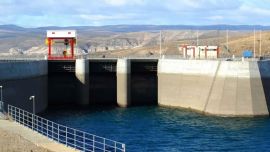Even a writer of creepy Gothic novels would be hard put to come up with two less appealing presidential candidates than Javier Milei and Sergio Massa. One hears voices in the air, communes with cloned dogs and dreams aloud of taking a chainsaw to just about everything he dislikes, the other – who represents much of what is nastiest about the venal political “caste” his rival rages against – is widely considered the most untrustworthy individual to be found in Argentine public life.
Until a few weeks ago, the eventual winner of the long electoral contest was supported by only a third of those who bothered to vote. This means that the next president will take office without the backing of anything approaching a clear majority or even a big, well-drilled minority that is genuinely convinced he is the man for the job. Seeing that from the very beginning whoever wins will be forced to take measures that make life even more difficult for many who voted for him, he could become very unpopular indeed well before he has settled in.
Much has been made of Massa’s vigorous efforts to frighten the electorate into supporting him by insisting that, in addition to taking a wrecking ball to whatever is left of the economy and depriving millions of men and women of what little money they get, Milei would be forced by circumstances to behave like a dictator. Many people agree with him, but in this respect Massa himself looks even more dangerous than the on occasion fiery libertarian. If in power, he would have no qualms when it comes to mobilising the trade union heavies who openly support him, as well as the cops, the Armed Forces and clandestine intelligence organisations which already supply him dirt to throw at his critics, which, as things stand, is something Milei would be unable to do. In either case, having a president with his back to the wall from day one is likely to have many unpleasant consequences.
It is often asserted that Argentina is fast approaching the end of an era. Those who take this for granted assume that something radically new, and with luck rather better, or at least more promising, is about to emerge from the chaos into which the country has been slithering under the Kirchnerite administration. If Milei comes out on top tomorrow, the existing order will go out with a bang; if the electorate favours Massa, it will die less rapidly; unlike his opponent, the Peronist will be more inclined to try and keep things more or less as they are.
On a more positive note, both men, along with much of the electorate, evidently believe that free-market capitalism works far better than any alternative. Foreign commentators who are trying to make sense of what is going on here have labelled Milei a right-winger comparable to Donald Trump and Jair Bolsonaro, which in their view is enough to locate Massa somewhere near the centre-left, but on closer examination the differences are less clear-cut. If Massa is keen on anything, it is crony capitalism; unlike Milei, he would have the government picking winners and losers, with the former coming from his many friends in the business world.
Last week’s debate between the two was a strange affair. Massa clearly dominated proceedings by treating his rival like an uppity schoolboy who had not done his homework and deserved to be expelled, but there are those who think, or hope, that his bossy behaviour harmed him in the eyes of the electorate because it made him look impossibly authoritarian. We shall soon know if they got it right. After all, while Massa’s hectoring of a weak opponent was off-putting, many people are aware that, given the unpleasant circumstances, what the country desperately needs is a strong leader who knows what he wants and is prepared to go to any lengths to get it. For those who feel this way, Massa is the man. As far as they are concerned, his lack of principles and his notorious willingness to jump ship if he thinks another will take him to a better destination are desirable qualities.
Argentina’s future has been made even murkier by the collapse and demoralisation of the middle-ground. A couple of years ago, it was widely assumed that Horacio Rodríguez Larreta would succeed Alberto Fernández, but in the primaries the Buenos Aires City mayor lost to Patricia Bullrich who had made much of how unexciting was his low-key moderation but then contrived to persuade voters that she herself shared the characteristics that cost him his candidacy. This left the country with what it has now, a choice between two men who, in a saner universe, would never get anywhere near a presidential palace.
In an attempt to make the most of a very bad situation, Mauricio Macri and his adherents, among them Bullrich, decided to support Milei and point out to him that, should he win office, in order to govern he would need their help in Congress. Other members of Juntos por el Cambio – starting with Radicals who have always resented having to play second fiddle to Macri – have drifted towards Massa who, for his part, has made much of his alleged determination to form a government of “national unity,” recruiting as many opposition figures as possible. Would this require him to break with the Kirchnerites? Perhaps not, but being the man he is, it would be surprising if Massa tolerated for long the proximity of someone as meddlesome and self-centred as Cristina Fernández de Kirchner. During his election campaign, he stealthily distanced himself from her and her crowd because he knew that, while he needed their votes, he also needed those of many who loathe her and what she has come to stand for.
No matter who dons the presidential sash when Alberto – who for over a year has been skulking near the exit – finally leaves the Pink House, he will find himself in charge of a country in which even people who have all the relevant facts at their fingertips are reluctant to confront reality head-on. If what they say is anything to go by, both Milei and Massa are among them; the libertarian because he seems to be unaware that putting into effect the sweeping reforms he proposes would be extremely difficult and the Peronist, who has spent months gleefully sowing the wind in order to buy the votes needed for him to get elected and as a result may soon find himself reaping a hyperinflationary whirlwind which could put a premature end to his term in office. For some, such a denouement would be poetic justice; for a great many others, it would be an overwhelming tragedy.



















Comments